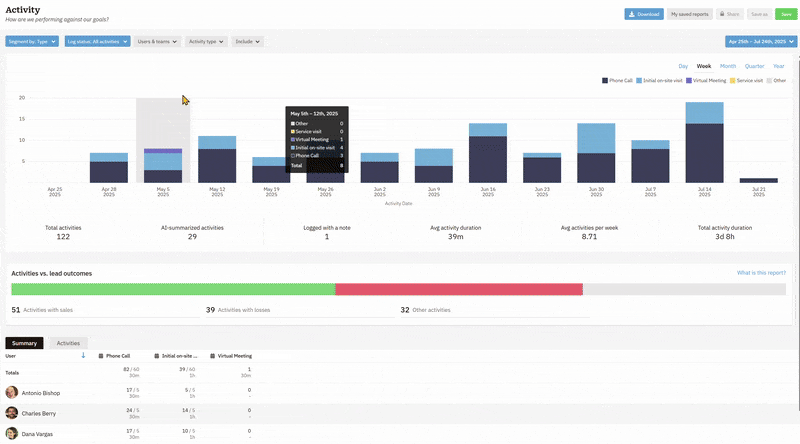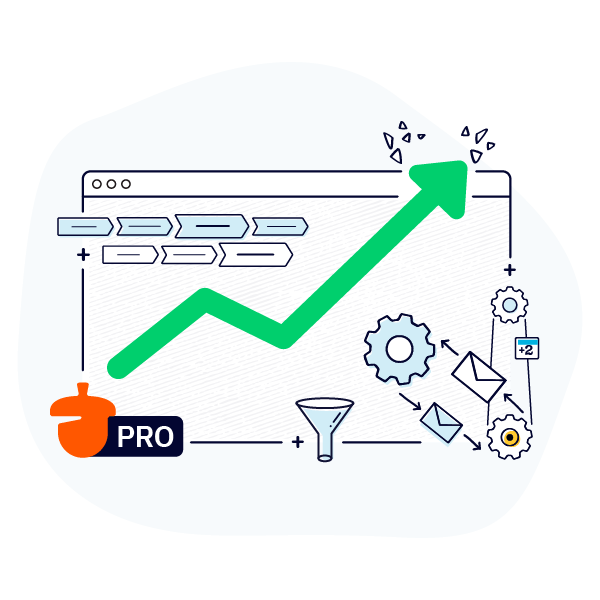
To manage your sales team effectively, you need to have a clear view of their activities and performance. That’s exactly what sales activities reports provide to sales managers.
Activity reporting is a proven technique sales managers can use to check up on the performance of their teams against quotas and, in organizations that motivate their reps through competition, how each rep is doing relative to one another.
Keep reading to learn about sales activity reports and how sales managers can use them to coach their teams toward their goals.
A CRM activity report provides a detailed overview of a sales team’s actions, such as calls and meetings, over a specific period, offering managers insights into team performance and individual efficiency. By using a CRM with integrated tracking and reporting, sales managers can automate the collection of this data, which helps in identifying areas where reps can improve to meet their quotas. These reports facilitate more effective coaching by providing concrete data for performance discussions, which helps in creating a culture of accountability and allows for targeted guidance to improve sales outcomes.
A sales activity report provides a detailed look at the sales activities that a sales team has completed over a given period, such as phone calls, emails, and on-site meetings.
This gives sales managers valuable insight into team performance and individual sales rep efficiency.
A sales activity report includes a record of the actions a sales team has taken over a given period. Some of the metrics that might be included in a CRM activity report are:

The easiest way to report on sales activity is to use a CRM with built-in sales tracking and reporting. A CRM like Nutshell automatically tracks your sales activities, allows sales reps to take notes about activities, and produces reports that make it easy to analyze results.
Nutshell’s robust reporting features allow you to pinpoint ways in which each of your sales reps can achieve–and surpass–their quotas, which is exactly what you need when coaching your sales team to greatness.
Nutshell makes it easy to track your sales activity with user-friendly, customizable reporting and analytics features.
Pairing coaching with the insights of sales activity reporting is a powerful combination. Here’s a look at some of the ways that sales activity reporting can enhance how you coach your sales team.
Sales activity reporting is a microscope into your team’s daily actions. It provides a granular view of who’s doing what, how often, and with what outcomes. With this level of precision, coaching becomes a highly targeted endeavor. You can zoom in on specific behaviors and actions, offering tailored guidance to help each team member flourish.
Gone are the days of subjective coaching. Sales activity reporting brings hard data to the coaching table. Coaches can back their feedback and recommendations with concrete numbers, making the coaching process more objective and credible. It’s not just about saying, “You need to make more calls,” but showing precisely how many calls lead to conversions.
With sales activity reporting, accountability is built into the process. Team members can track their own performance metrics, creating a sense of ownership over their results. Coaches can then step in to guide and support, knowing that every team member is acutely aware of their contributions and areas for improvement.
In the fast-paced world of sales, timing is everything. Sales activity reporting offers real-time insights, allowing coaches to provide immediate feedback. Whether it’s addressing a missed opportunity, celebrating a milestone, or fine-tuning a pitch, real-time coaching ensures that the team stays agile and adaptable.
One size does not fit all when it comes to coaching. Sales activity reporting reveals the unique strengths and weaknesses of each team member. Armed with this information, coaches can design personalized training programs that address specific needs, ensuring that every individual gets the guidance they require to excel.
Recognition is a potent motivator. With sales activity reporting, coaches can easily spot and celebrate wins, whether it’s a high-value deal closed or a record-breaking number of calls made. Recognition boosts morale and sets positive examples for the entire team to follow.
Sales activity reporting enables benchmarking against key performance indicators (KPIs) and industry benchmarks. This benchmarking empowers salespeople to see how they measure up and what they need to do to reach the next level, all under the expert guidance of their coach.
Get 70+ expert strategies for sales management success in our Sales Manager’s Survival Guide.

Nutshell customer Mike Dohrman, a vice president and sales manager at Gretna, Louisiana-based Acme Truck Line, Inc., has found that activity reporting can help drive collaboration and competition.
“We use [our CRM] mainly as a sales journal to provide transparency in the sales function,” Dohrman says. “We have overlapping customers in different regions. We have an outside sales group that does a lot of luncheons and meetings, and we capture the sales calls in detail. Since I have the activity report, I don’t have to spend time in meetings interrogating each of our 23 reps on how they did last week. I can see how they did and I know exactly what I need to talk to them about.”
The activity report is Dohrman’s go-to feature in Nutshell. The report tells him exactly how each of his reps are progressing toward meeting quotas and other goals and how the team and individual reps are performing for any time interval. Dohrman can even drill down to see a rep’s performance with an individual customer.
“If something interesting is going on with a specific customer, or if the rep is spending an unusual amount of time with that customer, I don’t have to dig to get that information out of the rep,” he explains. “It’s right there in the report for both of us to see.”
CRM activity reports help sellers become more effective because they give their managers the hard data necessary to provide actionable guidance and coaching—while keeping team meetings shorter and more productive so reps can spend more of their day selling.
Because Acme Truck Line’s sales team consists of outside sales reps who are expected to be on the road frequently, Dohrman is not especially concerned with how much time they spend at their desks. What does matter is the number and quality of the calls they make over the course of the week.
“I’m not so much concerned about the time of day they make these calls,” he says, “but if I think there are any issues with their time management skills, it’s useful to know what days of the week they are, or aren’t, making calls. If someone is kicking butt on Wednesdays but slacking off on Fridays, that might be a concern, or it might not. That person might be calling on an area where everybody takes a half day on Friday or something of that nature.”
Dohrman relies heavily on the detail section of Nutshell’s activity report. “I need to see substance in the notes on the calls,” he insists. “If the rep just dropped by to say hello, that’s not a sales call—that’s a doughnut run.”
Dohrman critiques not only his reps’ selling techniques but their note-taking as well. “If I suggest five things I want them to ask during every sales call—what size trucks, what lanes they’re using, that kind of thing—then I want to see the finer points in the notes, so by the fifth sales call, I know everything there is to know about the company,” he explains. “I may never been to that company, but because it’s in the notes, I know all that. As a team, we all know all that.”
Effective call reporting comes more easily to some reps than others. “I explain it like this,” Dohrman says. “The driver has to fill out a bill of lading. We know when the goods are delivered and who accepted them. He brings us the bill of lading, and we invoice the customer. It’s no different for the sales rep. You didn’t make the sales call unless it’s in writing.”
Attend a live guided tour! Every Tuesday at 3pm ET / noon PT.

Acme reps call on thousands of customers across the U.S., many of whom are large, multi-site companies. A rep calling on one site may be in a position to gather useful intelligence on that same company’s decision-maker at another site in someone else’s territory. (See: account-based sales) Effective call reporting, accessed through the CRM activity report becomes much more than a sales management resource. It serves a knowledge management function, allowing each rep to open doors for their peers.
“If you find out about an opportunity with a big company in their Brownsville, Texas office, you don’t have to go to your sales manager to find out who calls on that company at their headquarters in Colorado,” Dohrman says. “You can just go to Nutshell, and that’s in the activity report with detailed notes.”
Related: Why ‘conscious collaboration’ is the key to sales success
Sales teams typically maintain a balance between this kind of collaboration and performance-driving competition between reps. The system allows the sales manager to set goals and quotas for each rep and the team. Those goals can be used to fine-tune each individual’s performance and administer incentive programs. These incentives can be based not just on the ultimate sales numbers but on actions that management chooses to reinforce.
“If I see someone who is sending out way more emails and making way more phone calls than they are actually calling on people, I can see that and advise them on it,” Dohrman says.
The report is accessible to all team reps, who can see each other’s activity rates and notes. Of course, Acme sales managers are much more interested in the quality of the calls than in stoking competition between reps to see who can send out the most emails.
Now that you understand how sales activity reporting is a game-changer for managing a sales team, let’s look at a few best practices to make the most of CRM reporting to guide your sales reps.
To learn how your team can take advantage of Nutshell’s CRM activity report feature, check out this video overview or our handy knowledge base article.
If you’d like to give Nutshell a try for yourself, just start your free 14-day trial today!
This article is part of our Playbook for Managing a Sales Team.
Activity reports track the actions your team takes (calls, emails, meetings), while performance reports measure outcomes (revenue, win rates, deal sizes). Think of activity reports as leading indicators that predict future results, and performance reports as lagging indicators that confirm past results. For coaching, activity reports help you intervene early when behaviors need adjustment.
Review activity reports weekly for trend spotting and monthly for formal coaching sessions. Daily checks can overwhelm both you and your team. The sweet spot is weekly reviews to catch issues early, combined with monthly one-on-ones where you discuss patterns and create action plans based on the data.
The biggest mistakes are focusing only on quantity over quality, using data to punish rather than develop, and ignoring context behind the numbers. Avoid creating “activity for activity’s sake” where reps make meaningless calls just to hit quotas. Instead, balance volume metrics with quality indicators and use the data as a conversation starter, not a verdict.
Start simple with your CRM’s built-in reports rather than creating custom ones. Focus on 3-5 key metrics that directly impact revenue. Use automated data capture features to minimize manual entry, and designate one tech-savvy team member as the “CRM champion” for 2-3 hours weekly. Many CRMs like Nutshell offer pre-built activity reports that require zero technical setup.
Research shows that follow-up speed (responding within 4 hours), meeting-to-opportunity conversion rate, and consistent activity levels are the strongest predictors of sales success. Focus on metrics that measure both effort and effectiveness: calls that convert to meetings, emails that get responses, and the number of meaningful conversations per week rather than just raw activity counts.

Join 30,000+ other sales and marketing professionals. Subscribe to our Sell to Win newsletter!